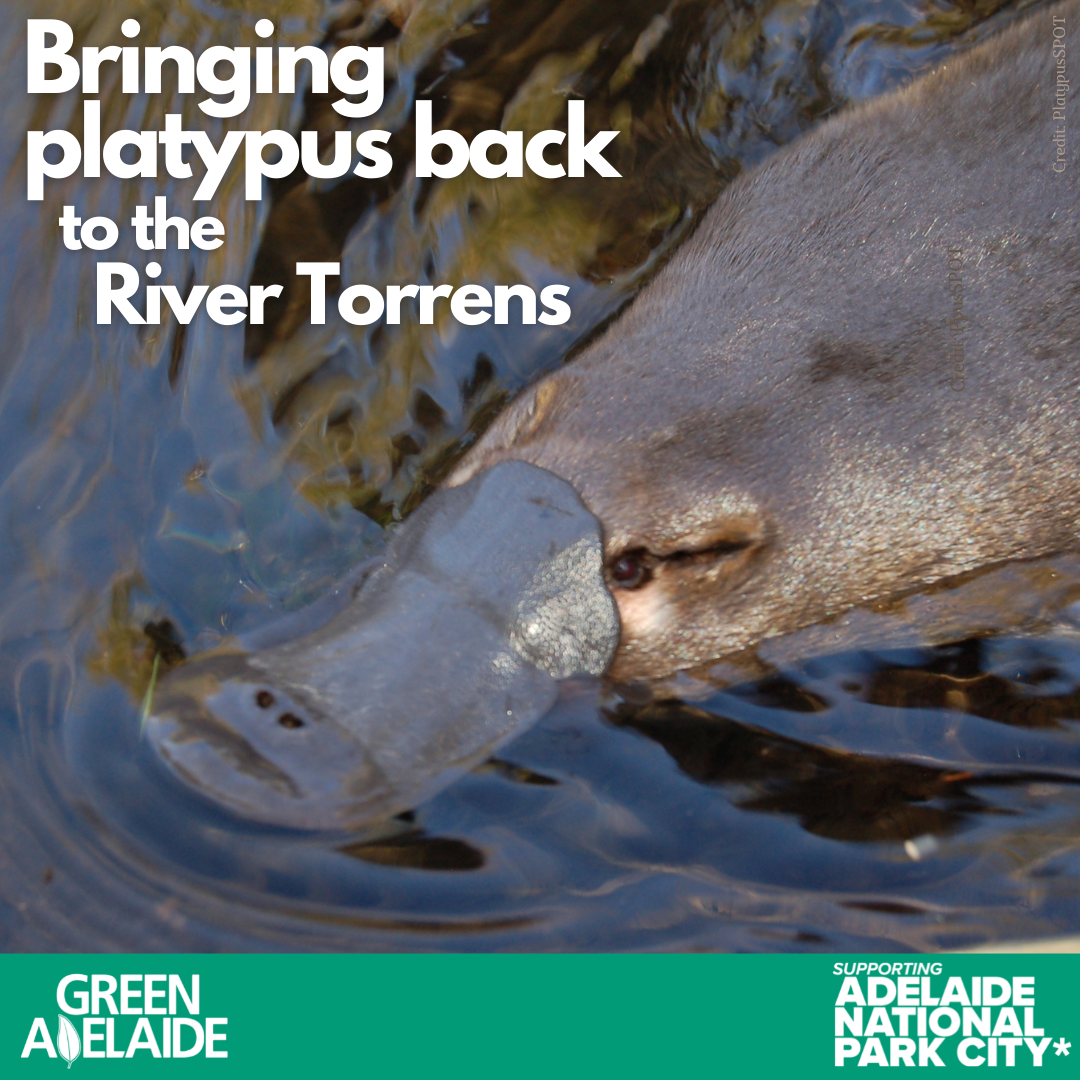Platypuses might be reintroduced back to the River Torrens/Karrawirra Pari. Here’s everything you need to know.

Platypuses have been considered extinct from the wild on mainland South Australia since the mid-1970s. It’s a far cry from the late 1880s when they were common in the city’s River Torrens / Karrawirra Pari and some other Greater Adelaide waterways.
Today, platypuses can only be reliably found in the wild on Kangaroo Island, after a successful translocation in the 1920s.
There were some sightings in the Riverland during the 1990s, and more recently in 2018, but unfortunately there isn’t any evidence of populations – in social media world we’d just say: ‘pics or it didn’t happen’. With eDNA (environmental DNA) sampling taking place nowadays, this could soon be another option to get proof of these platypus populations.
But back to the story. While there has been an absence of platypuses in the wild on mainland SA, this could soon very well change.
We are leading the development of a scoping study to better understand the possibility of bringing platypus back to the River Torrens / Karrawirra Pari.
Here’s everything you need to know:
Why focus on the platypus?
Platypuses are listed as a threatened species in Australia and are endangered in South Australia.
They are a unique mammal with a bill like a duck, a tail like a beaver, fur like an otter, and webbed feet like… we’re back to ducks again.
Oh, and they lay eggs – just like echidnas do. These types of animals are known as monotremes – mammals that lay eggs, and have no teats.
The iconic Australian platypus is what is known to ecologists as an umbrella species – meaning that conserving them and their habitat will result in many other species also being conserved.
So, if platypuses can be successfully reintroduced to the River Torrens/Karrawirra Pari, this will mean a healthier ecosystem for other native species like long-necked turtles and native water rats (rakali).
Plus, having these interesting creatures in Adelaide’s waterways again could also be a nature-tourism drawcard.

Why focus on the River Torrens/Karrawirra Pari?
There are records of platypuses living along the River Torrens/Karrawirra Pari in the early 1800s, and they are now a missing vital part of the Torrens ecosystem.
Returning platypusese to the river would be an incredible mark of success for Adelaide’s 85-kilometre Torrens restoration efforts over the last 40 years.
Is the River Torrens/Karrawirra Pari healthy enough for platypuses to survive?
The Torrens is and always will be brownish like most of Australia’s rivers, like the River Murray. This is due to the tannins in Australian vegetation and soil.
The River Torrens/Karrawirra Pari has come a long way, and with today’s improved native vegetation and water quality – thanks to lots of recovery work by many experts over the years – it is the right time to investigate reintroducing platypuses to the river.
Also, there is a strong population of rakali in the Torrens today, so if the river is supporting these native mammals already, platypuses may have a good chance at a good life there too.
What will the study scope?
The scoping study will reveal the suitability of the Torrens for platypus to live a good life. The study started in late 2021.
Things like food availability, space and the flow of the river (for safe platypus movement) will be investigated as they are key to platypus survival.
The study will also explore the types of risks that would need to be managed. For instance, there’s opera house traps (yabby nets) that can drown platypuses, water pumps that can suck them up, as well as predators like foxes that might attack them.
The scoping study will be initially shared with project stakeholders, before a broader project update is made available to the community.
If the study reveals that reintroducing platypuses is indeed possible, then the next steps will be exploring sites along the Torrens and population sources.

How you can help
As the project progresses, a Friends of the River Torrens Platypus Community Group and a Platypus Fund will be developed to further this important work to re-wild the River Torrens/Karrawirra Pari.
Subscribe to our monthly newsletter for the latest on this project straight to your inbox.
This content was written in partnership with Good Living.
(Banner image credit: PlatypusSPOT)
Story originally published 12/8/2021